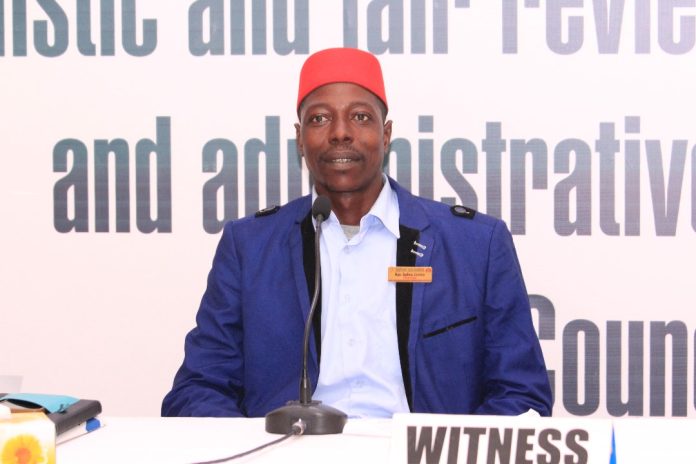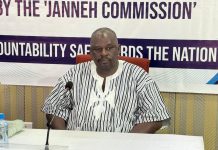By Yankuba Jallow
Saihou Jawara, Chairman of the Kuntaur Area Council, has emphasised the need for an equalisation grant from the central government to help local councils meet their development needs. Speaking before the Local Government Commission of Inquiry, which is investigating the financial and administrative conduct of local councils from May 2018 to January 2023, Mr. Jawara explained that the government’s current conditional grants and subventions are insufficient.
“Capital development projects are projected at D9 million and more,” Jawara said. “I call for an equalisation grant from the government to support the local councils for their development initiatives.”
An equalisation grant is a financial transfer from the national government to local councils aimed at reducing disparities in the capacity of councils to deliver services, especially in less wealthy or resource-constrained areas. This grant helps balance fiscal capabilities so that all councils can provide basic infrastructure and social services to their communities.
Mr. Jawara, who was elected in May 2018 and re-elected in May 2023, appeared jointly with former CEO Pa Nfansu Darboe, who served the council until 2020. Both testified to several administrative and financial challenges faced by the council.
Regarding revenue generation, Jawara explained that each of the ten wards in the council area used to receive D50,000 for development initiatives, but this was increased to D100,000 last year. The council’s Director of Planning monitored the implementation of these projects.
Jawara said, “The government used to give us a conditional grant of D500,000 and later changed it to a subvention. The grants from the government are not sufficient because the cost of one borehole is more than D500,000.”
On revenue assessment and management, Jawara admitted there were weaknesses. He explained that revenue collectors conduct assessments, sometimes accompanied by councillors. “I am aware of the revenue suppression in the council,” he said.
When asked how the council ensures collectors report accurate figures, Jawara replied, “Sometimes the councillors join the collectors in the assessment.”
Former CEO Darboe added that the council’s jurisdiction covers five districts. “We have an appendix where we divide the area based on the districts and tabulate the total expected income from the districts,” he said, adding that the appendix details how much is expected from each village, including dues from GSM companies.
Darboe noted, “The collectors go village by village. The councillors go with them. I found the council collecting D500,000 per annum but increased it to D1 million.”
He also highlighted markets as a revenue source, saying income fluctuates seasonally. “During the rainy season, income from weekly markets goes down. The peak period is around November, December and January.”
The Commission raised concerns about revenue suppression by some collectors, including an instance of D198,000. Jawara said the council considered forming a taskforce to improve assessment but was constrained by limited cash flow. He shared examples of his own initiatives to increase council funds.
Chairperson Jainaba Bah interjected to suggest the council obtain independent revenue data, such as from GBOS, to improve accuracy. Darboe agreed, saying the council has bilateral meetings with the government, involving the Ministries of Finance and Regional Government. “The government knows the local councils do not have a large revenue base,” he said.
Darboe also noted that the council’s budget is not always realistic. “The amounts projected are higher than what is actually on the ground.”
Turning to procurement, the Commission questioned the awarding of borehole projects to Sinkandi Enterprise, worth over D800,000. Jawara said he was not involved in the project, but Darboe said Jawara was briefed. One borehole contract was advertised in the newspaper; the other was not. Darboe explained the council did not have a Contracts Committee and admitted procurement rules were violated.
Darboe said withholding tax of 10% was deducted and paid to the Gambia Revenue Authority.
When Chairperson Bah asked if the council had failed in financial management, Jawara replied, “Yes, Madam Chair.” He admitted serious lapses in compliance with governing instruments and asset management.
On the relationship with contractor Sulayman Joof, Jawara explained Joof was introduced to him by the CEO. Joof required lodging in Kaur during borehole drilling, and Jawara offered his compound. He acknowledged that money changed hands between them.
“I was helping this man for the best interest of my people,” Jawara said.
Joof reportedly told the Commission that Jawara paid him D299,000 by cheque among other payments. Jawara clarified, “I have never received anything from this man that is not mine. He came before the commission and said he had given me money. He has never given me anything that is not mine. He is staying in my compound, and I have been supporting him. I was taking the cheques and giving them to him to get my money from him. He is still owing me D90,000.”
Jawara admitted the contract awarded to Joof did not follow due process. “It was a decision of management and council. It was not single-handedly made,” he said.
Asked about documentation, Jawara said he would try to find the council resolution or meeting minutes related to the contract.
Lead Counsel Gomez asked if it was proper for the chairman and contractor to be borrowing money from each other. Jawara replied that he acted as a community member in addition to his official role, as he was doing so out of a good gesture of supporting Joof.
Gomez responded that the funds used to pay Joof came from taxpayers and public funds, not personal sources.
Jawara said he did not know the arrangement was wrong. “If I knew that, I would not have given him my money.”
On a controversial payment of D100,000 to the Governor of Central River Region in 2019 during the COVID-19 pandemic, Jawara said he initially opposed the payment but was convinced by the CEO. Darboe said a donation of D100,000 was deposited into the council account and later requested by the governor’s representative. Both admitted fault in the handling of the matter because their conduct was contrary to the dictates of the law on how to disburse council funds.
Regarding internal audits, Jawara said the council reviewed reports in general meetings. Minutes from the 15 April 2019 meeting were tendered and admitted as evidence. He said audit issues tended to recur, but the council instructed the administration to address them.
The witnesses were candid about challenges faced by the council and expressed willingness to improve governance. They stressed the importance of increased financial support through mechanisms such as the equalisation grant to enable local councils to better serve their communities.



















